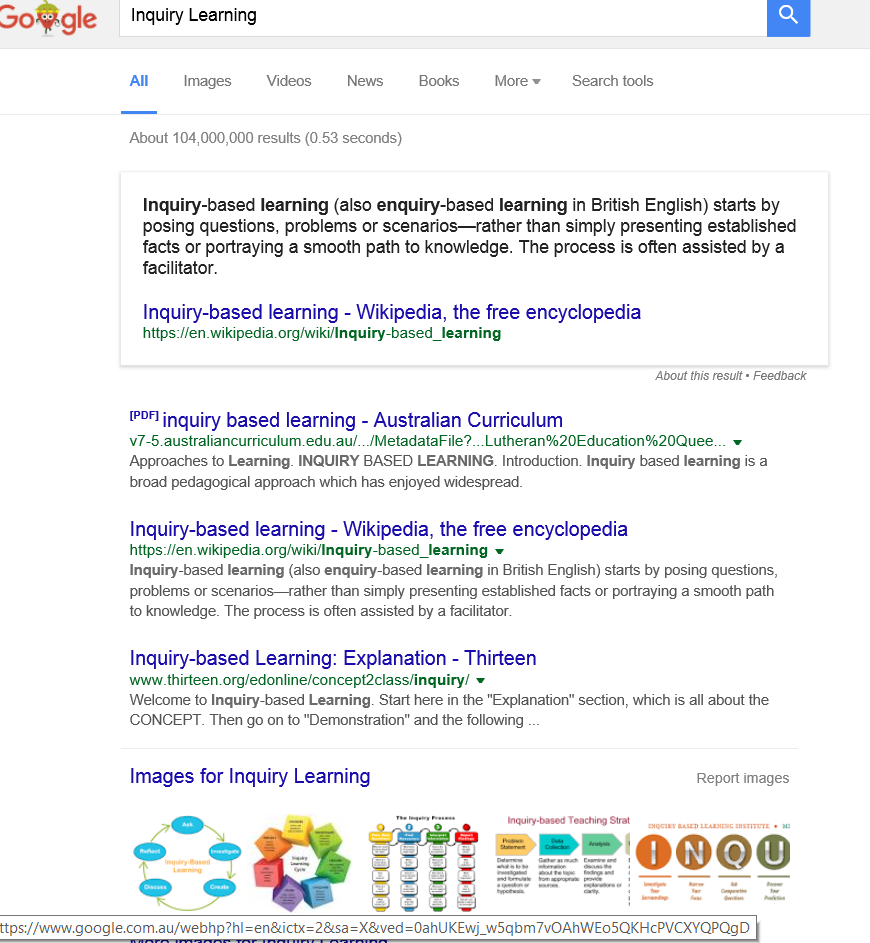These are the voyages of the Starship Enterprise…
Welcome to my blog! I am currently teaching Music to secondary school students in a beautiful inner-city Brisbane school, where I am also in a middle-management Pastoral position. I am passionate about Arts education and also have an extensive background in Dance education. This blog was created to satisfy the requirements of a subject for my Masters of Education – “Inquiry Learning,” yet it also will hopefully be a useful resource for not only my own students, but other educators to use, as they explore the infinite possibilities of inquiry based tasks.
What do I currently know about Inquiry Learning?
I must admit, my own understanding of Inquiry Learning was somewhat limited when I started on this voyage. In fact, I had to google the reason why Inquiry was spelled with an ‘I’ and not an ‘E,’ hopeful that it wasn’t just a case of American-English taking over. Thankfully, the ever-faithful Oxford Dictionary could help me out, and I realised that Inquiry (with an ‘I’) referred to a more formalised investigation, rather than just questioning. Further, “Inquiry” is the spelling favoured by American English, and the Inquiry Learning movement began in the United States. Inquiry Learning suggests to me a process whereby students investigate a topic of their choice, reflect on their findings, discover new topics to investigate and in turn gather a deeper and more rich understanding of the subject area. As a teacher of Year 12 Music Extension, this sounds exactly like what the purpose of the “Investigating” task is, and I have enjoyed developing my student’s confidence over the years in exploring new topics and seeking out new areas to discover. However, I always felt supported by the wonderful Teacher-Librarian we had at our school, and since she left 12 months ago there has definitely been a need for me to step up and support my students in their Investigations as she used to. Musicology assignments also may lend themselves to a well-developed Inquiry Learning process so it is important that I develop my own knowledge, skills and understanding in this area in order to support my students.
What do I want to know about Inquiry Learning?
My initial searches and research into Inquiry Learning made me feel like Captain Kirk at the beginning of the U.S.S. Enterprise’s 5 year mission into deep space. Which path should I choose? Where should I direct my initial research? How can I come back from the brink of obliteration? My initial google search of “Inquiry Learning” returned 104 million results in 0.53 seconds. If the universe is said to be always expanding, I’m pretty sure a basic search for “Inquiry Learning” would give me an ever-expanding list of results. If I want to learn more about Inquiry Learning, I will need to be bolder and more refined in my search processes.

Do I think Inquiry Learning is “the final frontier?” Of course not! It is one of many educational “frontiers” that need to be explored and understood, but for me it is a relatively new area of focus and a daunting one at that, as I have no experience in Teacher Librarianship. It may be a coincidence that the new Star Trek movie has only just been released, and I don’t really need any excuse to be distracted by Michael Giacchino’s beautiful music or Chris Pine as Captain Kirk, but I feel that the metaphor of space travel is an appropriate one, as there is so much information out there that needs to be explored. Nevertheless, I have managed to focus my initial research into three focus questions:
1. How can Inquiry learning principles and tasks be used effectively in the Music classroom, leading to meaningful and worthwhile learning outcomes?
Or more simply- How is Inquiry Learning used effectively in the Music classroom?
——————————————————————————————————–
2. What evidence is there for relevant stakeholders (parents, administration etc) that Inquiry Learning truly empowers students and is a worthwhile usage of precious curriculum time?
Or- What evidence is there of positive outcomes in an Inquiry based curriculum?
——————————————————————————————————-
3. How important is the role of the teacher-facilitator and what amount of scaffolding is necessary for optimal results in Inquiry based projects
Or- What is the role of the teacher in supporting and facilitating the Inquiry Learning process?